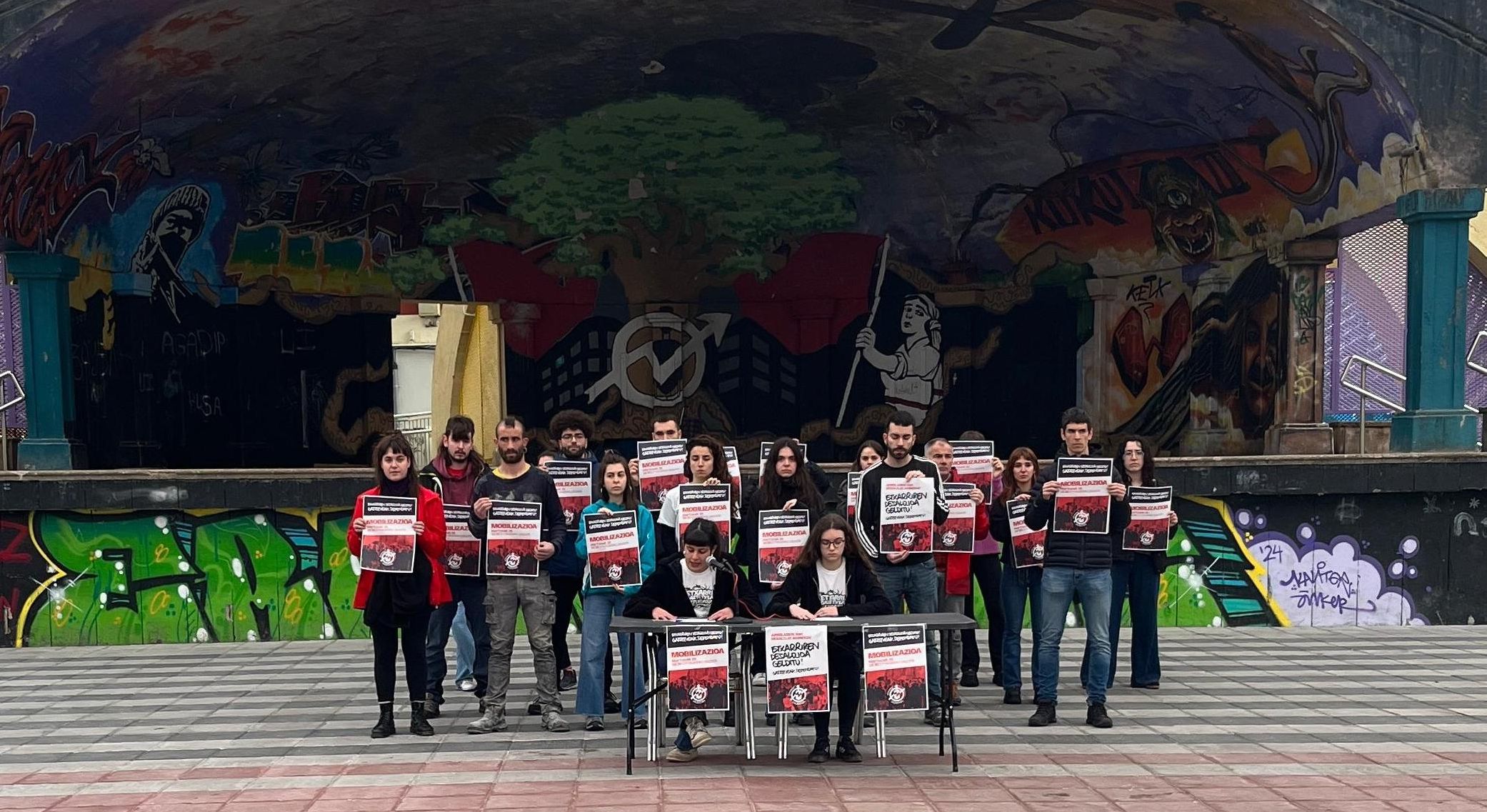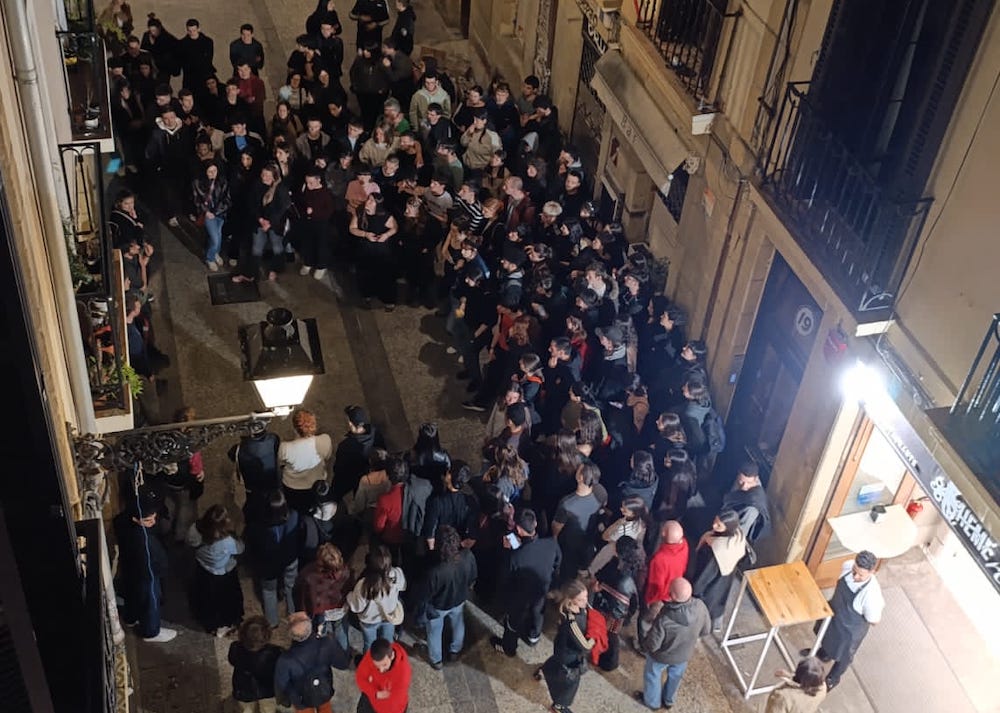Massively spied society
- “For a long time, the idea of a fully guarded world has been regarded as utopian or paranoid madness, a hallucinated imagination of people obsessed with conspiracy theories. However, the truth is that here and now we live under the control of a kind of Zelata Empire. Without realizing it, we're becoming more and more vigilant, more controlled, more fictional.

New technologies are becoming more acute every day to follow our footprints. Commercial companies and advertising agencies explore our lives. On the pretext of the fight against terrorism and other plagues, governments, including the most democratic, have built the Big Brother, who have no hesitation in being able to better monitor us even when breaking their laws. These new Orwelliary States secretly try to create specific files with our personal data and contacts, drawn from multiple electronic media, in many cases with the help of the giants of the Network.”
These powerful words are from journalist Ignacio Ramonet, author of the book L'Empire sous Surveillance (2016). This work is the raw portrait of the panorama collecting the data that several people – those who touch alarms – have filtered in recent years endangering their lives.
“What worries me is not that we live in the society of the prison, but that we live in a society that does not concern us,” said the sociologist and philosopher Zygmunt Bauman.
Does the articulation of states, militarized intelligence services and multinationals on the Internet mean the end of private life?

The end of private life?
They suspected it, but they've all been boycotted.
The Telefónica technicians have found that the phone line is diverted to the top floor, in front of all those in the office. They immediately began to look for strange things and in the exterior of the building, concealing several cables, a two-meter tube that led to the first floor has been located. All of a sudden, you hear noises from the top floor, sudden movements, nervous people. At one point, the bottom bar customers have seen three people running out of the building, with sports bags full of up to the neck. Despite the fact that they have left many documents behind in a hurry, they have not taken them for a short time.
Cesid wanted to video the HB meetings. With this news item, Egin broke the political scandal on 1 April 1998. It was known that the Spanish secret services monitored the headquarters of Herri Batasuna in Ramiro de Maeztu Street in Vitoria-Gasteiz, both from the top floor and from a parallel dwelling. The communication remained painted for six years and was illegalized. The news had to bring a long string. Egin’s research group, led by Pepe Rei, made public the identity of several spies; Cesid acknowledged that he had to change his entire structure in Hego Euskal Herria; several senior officials were tried and sentenced for illegal squats; some ended in prison, although then the Aznar government pardoned everyone.
The “classic” espionage to discover the secrets of the political and enemy cellar has been a common thing. However, years have not gone by in vain, and spending billions of dollars each year on the field of new technologies and the military has direct consequences. Today, one thing is clear: whoever wants to spy on communications from a person or group does not have to arrange such a shameful physical operation. Other channels are more effective and cautious, and enable the communications of almost the entire population to be monitored. What the law and rights say, that is the cider of another cuba.
More than states, companies spy on people.
“Be careful when you browse the Internet, with every search and every click, you’re left with little hints about your private life and some private companies are in charge of receiving everything and archiving it in secret, especially Google.”
Remember the word GAFAM. It is used to designate the five most powerful companies on the internet: Google, Apple, Facebook, Amazon and Microsoft. According to Julian Assange, it is large companies that spy on citizens rather than states. This Australian journalist is an entrepreneur and an Internet programmer. Wikileaks has been recognised around the world by the publication on its website of diplomatic cables and secrets between states. The U.S., fleeing from country to country, lives at the Ecuadorian Embassy in London, where he cannot leave 2012 if he is not going to be arrested. This is an international arrest warrant which involves the complaint of rape and sexual abuse filed by two Swedish women against him. Assange and his followers fear that Sweden will extradite America. The request to judge by espionage and treason in the states of power of this country is strong and has the death penalty on the table.
Edward Snowden is also responsible for bringing these state secrets to the attention of citizens all over the world. He currently resides in Russia, where he managed to escape a hotel in Hong Kong with the help of Wikileaks activists in 2013. He filtered thousands of files from the U.S. National Security Agency (NSA) to journalists Glenn Greenwald and Laura Poitras, among others. In the documentary Citizenfour, which is worth seeing, he explains the political reasons why this entrepreneur has changed his life forever with filtration.

The countries that have remained in Ipurdi’s sight will not forgive him easily, and some of them have even come to make ridicule. United States And the European Union, for example, decided to violate all the international diplomatic protocols, when the Evo Morales presidential plane, flying from Russia to Bolivia, was forced to land in Austria, accused of transporting Snowden. Their hopes faded. The former NSA worker continues to participate in videoconferencing at events around the world in defence of the right to private life vis-à-vis multinationals. “Facebook is a surveillance company,” he added in reference to the latest scandals.
If you don't pay, it's you who makes the sale
Activists have published that network and telephone multinationals sell to governments millions of user data by country. Websites that supposedly offer a “free” service have to profit from somewhere. Facebook gained 12.8 billion euros in 2017, 56% more than in 2016. The most valuable raw material companies like Facebook or Google have is the most detailed data related to the habits of millions of people.
The authenticity of the documents filtered by Snowden has never been questioned. Then NSA director Keith Alexander said: “[Snowden] betrays the trust he has placed in him. He had access to documents of the highest secret and his duty was to manage the networks. He violated that trust and stole some of our secrets.” Along the same lines followed Barack Obama, the then President of the United States, who also announced the election victory. He denounced the filtration, giving credibility to the content: “I don’t like filtering, there’s a reason for these programs to be classified.”

In addition, GAFAM has shown that they have a direct relationship with the US Government. Some of them have even become part of the structure. Synergies are evident, for example, Google and the Defense Department are jointly developing the Project Maven project “software to make drone attacks more accurate.” According to the digital media Ars Technica, “the revolt of Google’s employees, says the company should abandon military drone projects.” Thousands of employees wrote a letter to Google leaders asking them not to work with the Pentagon. On May 16, Maddi Txintxurreta, of ARGIA, has received the resignation of several workers from the company for opposing the use of technology developed by them to kill people.
Combating “terrorism”
Where do these globalized practices of citizen control and surveillance come from?
Following the Second World War, in order to spy on the Soviet Union and its allies, the following English-speaking countries signed the UKUSA agreement in secret: USA, United Kingdom, Canada, Australia and New Zealand; then Japan, Germany, Switzerland, Philippines, Taiwan, Turkey and Norway. The New York Times newspaper published that all of these countries had launched a network, called Echelon, during the 40 years of the Cold War. They built a global network of private and public communications. Snowden filtered that the United States has developed a worldwide communications visualization tool called PRISM, which allows the storage and analysis of information they receive from states, country by country.
The experts in the field presented as a serious decision six weeks after the attacks of September 11, 2011, the approval of the Patriot Act by the US Congress George W. Powered by Bush. Under the slogan “Either you are with us, or against us”, citizens’ rights were clearly cut off in the name of the fight against terrorism. The Association for Civil Rights of the Americas (ACLU) has denounced that this law gave the FBI the power to force Internet providers to report their customers.
British geographer Stephen Graham Cities Under Siege: According to the book The New Military Urbanism, these “fourth generation wars” take place in urban spaces: urban stations, stadiums, theatres, supermarkets, offices, apartments, commercial galleries, metro corridors, airports... “In this way, the city is at the heart of the concerns of the military leaders and, at the same time, the Western powers are weak or vulnerable. In view of this, the response of the authorities has been to increase the monitoring and control mechanisms in these fields.
Ignacio Ramonet denounces that every time a terrorist attack occurs, each country legalizes its own Patriot Act to “combat terrorism”, as Naomi Clein explains in his work The Shock Doctrine.

The Association for Human Rights ACLU argues that Patriot Act violates the United States Constitution and the Universal Declaration of Human Rights. Article 12 of the declaration states that: "There are no arbitrary interference in anyone's private life, family, home or correspondence, or attacks on their honor or reputation. Everyone has the right to legal protection against such interference or attacks.”
Furthermore, even those who, in the name of security, are prepared to deprive citizens of all freedom will never be able to guarantee total security. It is undeniable that a globalisation of terrorism is taking place and, for example, Daesh has attacked countries such as: Tunisia, Turkey, Kenya, Nigeria, Belgium, Canada, Australia, Denmark, USA, France, Catalonia... “States have to protect citizens, OK, but is it necessary for all citizens to become suspects? Watch the whole of society?” asks the veteran journalist.
Calls, e-mail, social media -- everything to the database.
“France’s is Europe’s second largest decoding centre, after Britain’s, giant computers automatically filter tens of millions of emails, SMS, Skype, Whatsapp, Facebook messages… via phone numbers or IP addresses.” This is described by the journalist of L’Obs Vicent Jauvert in his article Comment la France (Aussi) écoute le monde.
Le Monde first published that in the French State there was a mysterious service, defined as “secret defense”, concealed within the information services. Your name: Plateforme nationale de criptanalyse et de décryptement. For years the government denied it, until it recognized it in 2015. This French Big Brother is located in an underground premises on a boulevard in Paris. 150 mathematicians and computer scientists work with powerful supercalculators.
“One program knows the voice, another one comes back. Thus, data are classified by country. There are programs that link thanks to keywords, Facebook, e-mail and Skype; others analyze millions of metadata,” said journalist Jauvert.
Snowden's leaks have allowed states to store this data for years and then offer them a way to conduct a retrospective investigation of a given person. The aim is to keep a record of communications from all over the world for the past five years. If anyone ever draws attention, the key is to be able to search in that mass of data stored to build this person's contact networks and be able to investigate what has been done in the past.
Many of these data are taken out of private communications, but many others are giving them without anyone forcing me: the fingerprint to unlock the modern mobile phone, the applications that require biometric analysis, the personal data provided on social networks (movies, books, music... preferred, I really like that they give to political attitudes that can be documented with just one click, passing by personal photos uploaded to the e-mail.
How do you store the information?
The NSA stores data and metadata; the first are the contents of communications, the second are the details that describe such content. In the case of a phone call, for example, the audio of the conversation would be the data, while the metadata would be the telephone numbers of the participants, the time, the duration and the rest.

Journalist Glen Greenwald concretized the dimension of this problem in 2014 at Snowden: There is no room to hide: “In a total of 30 days, the NSA received over 97,000 million emails and 124,000 million phone calls from around the world. In 30 days he received the following information by country: 500 million communications in Germany, 2.3 billion in Brazil, 13.5 billion in India. Concerning metadata received in cooperation with the Governments of the countries: 70 million from the French State, 60 million from Spanish, 47 million from Italy, 1.8 million from the Netherlands, 33 million from Norway and 23 million from Denmark, to name a few. Since then, another four years have passed.
Cloud, Cloud, Nuage or Cloud. It doesn't exist. This concept is the result of marketing. The information is stored on the servers of the companies that upload to the “cloud”. When using Gmail services, for example, the information is stored on Google servers. By sharing a file through Dropbox, the file is sharing with Dropboxi. The same applies to other companies offering these services on the Internet.

And what about these files? Who knows? There is also no guarantee that users delete files from servers to confirm that they delete them. In January 2017, for example, due to a Dropbox error, previously deleted files appeared to users, some of them erased seven years earlier.
The right to private life to the pit?
The disappearance of landlines at home has meant an unlimited presence of the mobile. To this we add that the mobiles that have spread in recent years have two cameras, one face and the other open to those who are watching the citizen. That today there are cameras in the most intimate place of millions of homes, in which citizenship has been implicated voluntarily. Every time a cell phone is placed on the table, a microphone is placed so that it can hear anything, which can easily be turned on from afar or is always on. In 2011, seven years ago, we said on ARGIA Iphone, Android or Blackberry, based on the information published by Wikileaks in the article Excellent Social Control Tools:
“Even if your cell phone is off, send signals from where you are. Some companies have developed technology to decipher any sound that can hear that cell phone and identify the people behind it, such as SS8 in the US, Hacking Team in Italy and Vupen in France.”

Vizio, one of the leading Internet-connected smart TV manufacturers, is located in California (USA). United States ), had to recognize two years ago that its TVs guarded users: it recorded what users saw, allowing them, in some way, to know exactly what people like in their audiovisual leisure time. This information is sold to advertising companies, such as Facebook, Google, etc.
How far does spying go? The Pentagon, published on 3 May, has banned its military base soldiers from buying and introducing China’s Huawei and ZTE phone brands for fear of being spied by the Chinese Government.
With the arrival in the book of Ignacio Ramonet, all this implies a total invasion of the private life of the citizens. Former Wired magazine journalist and founder of 3Drobotics, for example, believes that in the near future, drones will spread a lot. “We will have millions of cameras flying over our heads,” he said in an interview in El País. The search for these drones will be based on the “pattern of life” or life model: if someone has “visually” patterns similar to those of a “dangerous” person, it will be noted.
Everything seems exaggerated in this 2018, but if you look at the news that goes unnoticed, you realize that the military industry is going in that direction. On May 16, the Cadena Ser, with her videos, published the following news: “RoboFly: The first drummer comes out that doesn’t need any battery.”
Data from all the citizens of the world?
But how do you physically save so much information that millions of people generate? The NSA is building the country’s biggest spy center (watch what you say), the great report on building the country’s largest spy center, NSA (watch what you say in Euskera), was answered in Wired space. Operating since 2014, it's the world's largest repository of data known as Utah Data Center, with thousands of servers and thousands of workers responsible for filtering communications and breaking encryption.
In December 2017, 4,156 million people out of the 7,500 million people living in the world were connected to the Internet World Stats. “The goal is everyone, anyone who communicates it is the goal,” a former NSA worker said in Wired’s report. Do we imagine a structure with constant data from all the citizens of the world? Does this have to do with what Facebook founder Marc Zuckerberg recently said that Internet connection should be a human right and guaranteed to citizens around the world?
Too much information
In The Human Condition, philosopher Hannah Arendt says that the disappearance of private life would be a tremendous calamity. It would be the end of free people and would lead society to new forms of totalitarianism. In this regard, measures may be taken to protect the sovereignty of States and the privacy of individuals at a time when the risks of mass surveillance are truly understood.
In 1948, Orwell portrayed absolute control with 1984. Control is an obsession of Dictator, and he didn't experience it. According to Ignacio Ramonet, “today we live what Orwell represented, but calling it democracy.”
The Internet, a decentralized space that was originally a source of freedom, has also changed radically. Currently, few oligopolies have an unimaginable concentration of power and, in addition to entering private lives, were we looking for more reasons to live in Basque?, they have the ability to control the flow of information. An example of this is that one of the most successful Facebook pages in Euskal Herria, Muy Bastas, which had 300,000 followers, was erased on April 27 by the dissemination of some feminist tweets by Irantzu Varela about group rape in Sanfermin. Community accumulated for years and capacity to influence the network, in five minutes and without explanations, in the garbage. Activists have responded with the "Very Bastas" return page, according to the statement.
“The Government will do anything to protect itself from the “main enemy”. And the “main enemy” of any government is its people. Just as large private companies will try to protect absolute control over the life of citizens,” said linguist, philosophical and activist Noam Chomsky.
Encrypt, defend
Isn't private life the bulk of our freedom? Are we not giving too much information? So what do you do about this?
Ignacio Ramonet devotes a chapter to the subject in his book L’Empire sous Surveillance. According to experts, the main measure of self-defence is to encrypt or codify text messages containing personal data. The book lists the following services: Signal, Telegram, Wickr, TrueCrypt, ProtonMail and Threema. Also the anonymous browser TOR. In specialized Wired media it has been gathered that the NSA has recognized that it is not able to decrypt many messages encrypted depending on their degree of complexity.
Smartphones aimed at beginners on the subject: Basic privacy, anonymity and digital self-defense guidelines for novices address the following issues: secure browsers for mobile, social networks, encrypted emails, how to create secure passwords – on the one hand, use phrases like passwords; on the other hand, never the same password in two sites – instant messaging applications and ethical providers of these services.
In addition to self-defence, activists around the world are trying to organise a counterattack: they are proposing an Internet Declaration aimed at guaranteeing digital rights, something similar to the UN Universal Declaration of Human Rights.
“Facing state surveillance, when you’re innocent, is a political struggle. Learning to protect yourself is a first step. Then you have to move on to the digital guerrilla: cheating spies, blinding, disguising our Internet connections, encrypting our emails, protecting our messages. The goal is for algorithms to go crazy, for secret digital transmitters not to control us,” says Ramonet.
We know, therefore, that every day we do meaningless network searches.

Pazienteek Donostiara joan behar dute arreta jasotzeko. Osasun Bidasoa plataforma herritarrak salatu du itxierak “are gehiago hondatuko” duela eskualdeko osasun publikoa.
Seaska Sarean inklusio egoeran dauden 165 ikasleei laguntza bermatzeko hasi dute kanpaina, antolaketa propioa eratuta. Frantziako Hezkuntza Ministerioaren jarrera salatu dute kanpaina aurkezteko prentsaurrekoan, behar bereziak dituzten haurren inklusiorako baliabide... [+]
Ikerketa parte-hartzailea eta gogoetatsua bultzatzen du Biharamunen Lantegia kooperatibak, eta zientzia eta ikerketa herriarengana hurbiltzeko lan egiten du. Duela urte eta erditik egoitza Bidarten dauka, eta Institut Curie-rekin elkarlanean Iker Herria ikerketa zentroa sortzeko... [+]
Amenabar enpresak Bilboko Udalaren eskutik apirilaren 4rako agindu duten desalojoaren kontra azaldu dira bilkuran. Poliziak indarrez kanporatu ditu. Ostiral honetan18.30ean, Errekaldeko Plazatik hasiko den manifestaziora batzeko deia luzatu dute gazteek, baita desalojoaren... [+]
Europako Batzordeak aurkeztu duen plana ustezko gerra edo hondamendi baten aurrean “bizirauteko” kit batetik harago doa: hogeita hamar neurri proposatu ditu eskoletan, enpresetan eta herritarren artean militarismoa eta beldurra sustatuko dutenak.
Bilboko Udalak eta Amenabar enpresak proiektu urbanistiko baten pean itxi nahi dute 10 urtez auzoko bizitza sozialaren erdigunea izan den topalekua. Horren aurrean, hiriko 55 kolektibok baino gehiagok manifestu bat sinatu dute prozesua gelditzeko exijitzeko.
Bilbo, 1954. Hiriko Alfer eta Gaizkileen Auzitegia homosexualen aurka jazartzen hasi zen, erregimen frankistak izen bereko legea (Ley de Vagos y Maleantes, 1933) espresuki horretarako egokitu ondoren. Frankismoak homosexualen aurka egiten zuen lehenago ere, eta 1970ean legea... [+]
Danimarkatik iritsi zaigu berria: 400 urtez estatuak eskainitako zerbitzua etengo du PostNord enpresa publikoak, eta eskutitzak banatzeari utziko dio 2025 urtea amaitzean. Gobernuak adierazi du enpresa publikoak negozioa paketeak banatzera bideratuko duela. Bi arrazoi eman ditu... [+]
“Hondakinik ez platerean!”. Hori zen kontsigna gure txikitako otorduetan. Janariak zeozer sakratu bazukeen, batez ere ogiak; lurrera erori eta, jasotakoan, musua eman behar zitzaion. Harik eta adin zozoan mamia baztertzeko moda etorri zen arte, lodiarazten zuelakoan... [+]
Hezkuntzari buruzko legediak, Ekonomia Lankidetza eta Garapenerako Erakundearen eta planetako jaun eta jabeen aginduei jarraituz, ikasleek ikasketa etapa bakoitzaren amaieran “irteera-profil” jakin bat izatea bilatzen du. Ez pentsa profila zerbait itxia eta bukatua... [+]
“Ez dugu gerraren aurrean etsi nahi, ez dugulako hilerrietako bakea nahi”, dio manifestuak, eta agintariei irtenbide politiko baten alde lanean jartzeko eskatu diete. Sinatzaileen artean daude Delàs institutua, Gernika Gogoratuz edo Ongi Etorri Errefuxiatuak... [+]
Kritika artean abiatu dira Gasteizko Arana klinika zena Nazioarteko Babes Harrera Zentro bilakatzeko obrak. Ez auzokideak, ez errefuxiatuekin lan egiten duten gobernuz kanpoko erakundeak, ez PSEz bestelako alderdi politikoak ez daude ados proiektuarekin: makrozentroen ordez,... [+]
Joan den asteko kaleratze "ilegala" salatzeko, manifestaziora deitu dute ostiral arratsalderako.
Nortasuna Sarean jardunaldien 10. edizioa egingo dute asteazken honetan Donostiako San Telmon, KomunikaziONA bideguruatzean izenburupean. Egungo komunikazio joerak aztertu eta "alternatiba osasuntsuagoak" topatzen saiatuko dira. Hainbat hizlari gonbidatu dituzte, euren... [+]
























